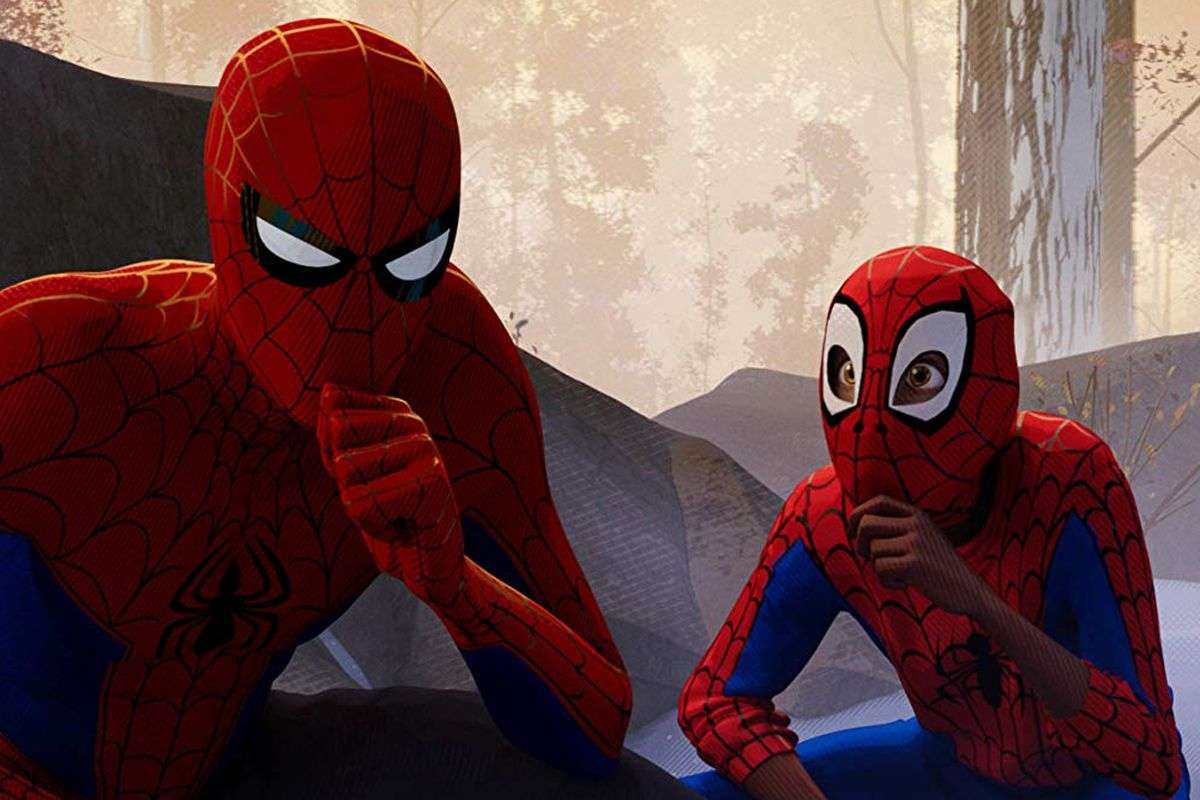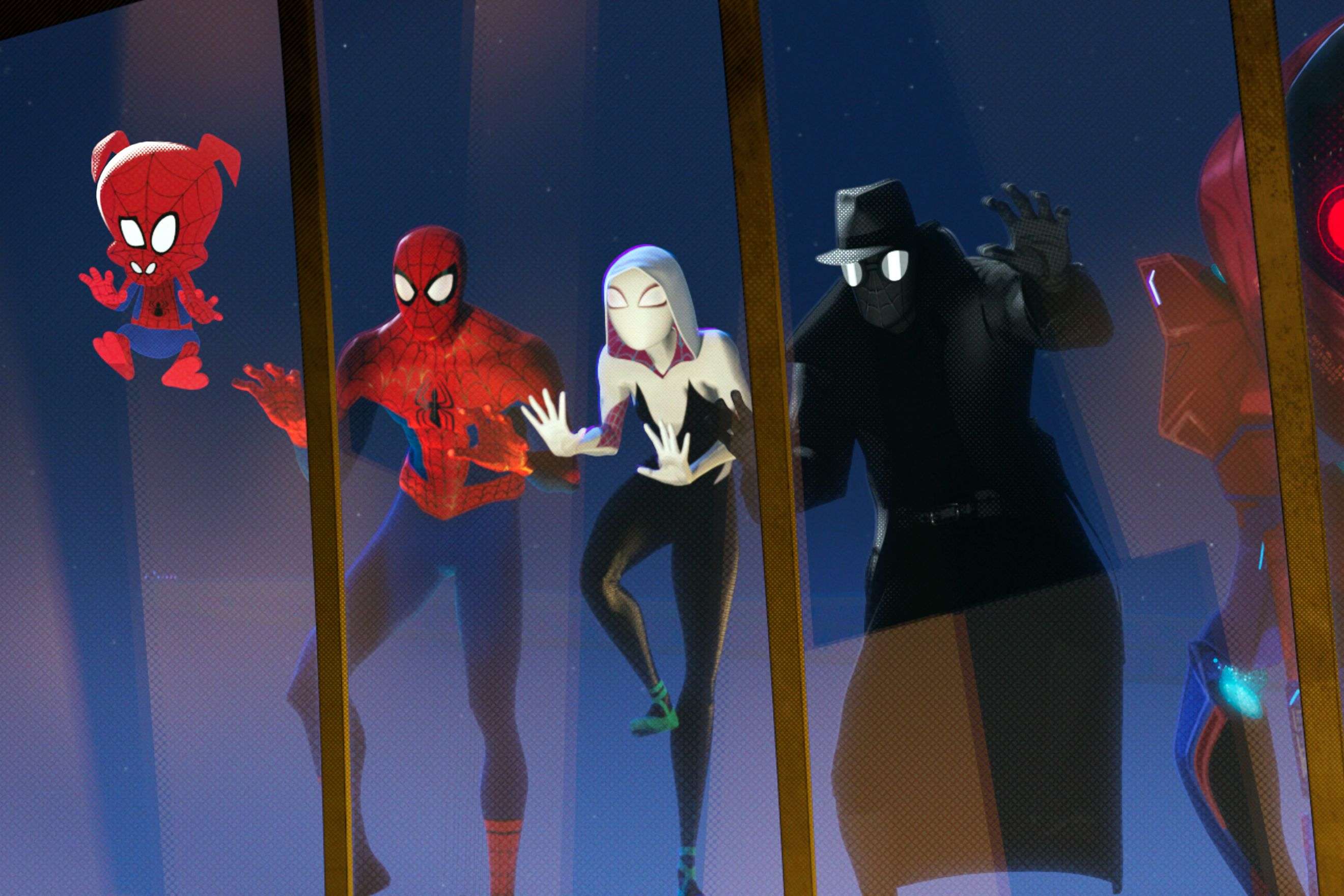Spider-Man: Into the Spider-Verse Is the Next Step in Superhero Movie Evolution
A joyous, energetic Spider-Man remix shows what superhero movies can be.

Earlier this year, I wondered whether superhero movies were stuck in a rut of cautious, formulaic competence. The new animated feature Spider-Man: Into the Spider-Verse makes a strong case that they aren't—or at least that they don't have to be.
For the last 20 years or so, superhero movies have focused on traditionalist takes on well-known characters, portraying them in their most widely known incarnations. But in the comics themselves, superhero identities tend to morph constantly: Multiple people have claimed the mantle of Captain America; for a while, Thor was a woman; and Peter Parker, the struggling newspaper photographer from Queens, hasn't been the only fictional New Yorker to wear a webbed spider-suit.
Superheroes aren't simply specific characters with fixed identities; they're ideas that can be recycled and remixed, taking on new forms and personas, changing with the times and with audience expectations. But despite their dominance at the box office, you wouldn't really know that from watching most superhero movies.
Into the Spider-Verse is the first big-screen feature to fully embrace the malleability of superhero identity. It revitalizes both the genre and the character, and it's an absolute delight.
Much of the film's success owes to its energetic, highly stylized animation. Most big-budget superhero movies are little more than computer-animated cartoons that pretend not to be. Yes, they have human actors and a smattering of physical props and sets, but they are filmed in front of green screens and built inside computers in an attempt to translate comic book sketch work into something that looks like it could exist in the real world.
Spider-Verse is largely computer-animated too, but it jettisons the live-action literalism that has sometimes held back other superhero films in favor of a jazzy, freewheeling hyperreality that in many ways does a better job of capturing the zany energy of hand-drawn comic books. It's a reminder that superheroes and the comics from which they originate are fundamentally cartoons, and live action is a constraint on what a superhero movie can be.

Spider-Verse follows Miles Morales, a half Puerto Rican, half African-American teenager from Brooklyn who takes on the identity of Spider-Man after the death of Peter Parker. As in the comics, Morales inhabits a parallel universe that largely resembles the main Marvel universe (and our own). This sci-fi conceit not only allows for a cleverly updated take on the character, it allows him to interact with a more traditionalist Spider-Man from yet another parallel universe—and eventually with a multiplicity of Spider-people, including Spider-Woman, Spider-Noir, and even Peter Porker, a cartoon pig who goes by Spider-Ham.
This may sound bizarre—and frankly at times it is. And yet it works, in part because of the zippy animation, and in part because it allows the movie to take the form of a conversation between multiple Spider-Persons about what the meaning of Spider-Man is.
The answer the movie gives is that Spider-Man isn't any one person but an ideal, a set of values, principles, and struggles that express themselves in varying ways for different people at different times, yet always resolve themselves in the same adage: With great power comes great responsibility. Being Spider-Man means choosing to accept that responsibility.
Last year, researchers published results from a study showing that young children worked more diligently at difficult tasks when dressed as Batman. You can certainly make far too much of gimmicky research like this, but the basic idea seems sound enough: Superheroes are simplified models for living, showing us what we can aspire to when we adopt their values and mindset. There's a similar idea at play in Spider-Verse, which is, at least in part, an argument that anyone can be—or at least be like—Spider-Man.
Under the ownership of Disney, Marvel has spent the last several years churning out competent, cautiously constructed blockbusters that play it safe all the way to global box-office dominance: Last weekend was the 13th this year that a movie based on a Marvel Comics property held the number one box office slot.
Meanwhile, attempts by Marvel's main competitor, DC Comics (which is owned by Warner Brothers), to copy Marvel's interconnected movie universe with films like Justice League and Batman v. Superman have been more miss than hit—although the success of Wonder Woman and reasonably positive early reviews for Aquaman suggest that quality levels may be improving somewhat.
Even still, a certain lack of ambition has come to define the format. Too many recent superhero movies have suffered from a kind of expectations-meeting blandness: They aim to be pretty good rather than great. Spider-Verse is a rare, and successful, exception. It's an ingenious animated triumph that shows how to expand the range of a well-known character like Spider-Man while offering an extended reminder why that character is so enduringly popular in the first place. It's the next step in superhero movie evolution.
Editor's Note: As of February 29, 2024, commenting privileges on reason.com posts are limited to Reason Plus subscribers. Past commenters are grandfathered in for a temporary period. Subscribe here to preserve your ability to comment. Your Reason Plus subscription also gives you an ad-free version of reason.com, along with full access to the digital edition and archives of Reason magazine. We request that comments be civil and on-topic. We do not moderate or assume any responsibility for comments, which are owned by the readers who post them. Comments do not represent the views of reason.com or Reason Foundation. We reserve the right to delete any comment and ban commenters for any reason at any time. Comments may only be edited within 5 minutes of posting. Report abuses.
Please to post comments


Superheroes aren't simply specific characters with fixed identities; they're ideas that can be recycled and remixed, taking on new forms and personas, changing with the times and with audience expectations.
There is only so much comics bloat you can lug along into a film (or franchise). Only an animated film could pull this off with any degree of success. And superhero movies work if you don't ask the audience to suspend disbelief too far. They usually have to be somewhat grounded or they end up a mess.
The Uncanny Valley of Bullshit.
Spider-Verse is the 13th movie this year based on a Marvel Comics property to open in the number one box office slot.
I think more like this:
Spider-Verse opened as number one at the box office, which is the 13th time this year a Marvel property held that slot.
I don't think there have been 13 movies released to theaters this year based on Marvel properties, certainly not opening at the #1 spot.
For what it's worth, I thought the movie was worth my time, but it helped that I had a free pass. Quite a bit of the movie I thought I was looking at a 3D print without 3D glasses, though. Maybe the theater was showing the wrong one...
No I had the same problem. They were imitating the cheaply printed comic books, where sometimes the page wasn't aligned perfectly when making different color runs- this would cause the red/blue/yellow to be slightly offset in the pictures. I was in the same boat at first when I saw this, but then realized what they were doing. Honestly, it was the worst technique. If they had dropped that effect and kept the rest, the movie would have been better. However, I think they threw those in there just to underscore "HEY, WE ARE TRYING TO LOOK LIKE A COMIC BOOK!!!"
Honestly, it was the worst technique.
I thought the coloring was a gaudy, but the combination with the stop-motion-like effect put it over the top. I hope this isn't the Blair Witch, cinema-shaky-cam-verite trend of the next several years.
Peter Suderman isn't simply a specific character with a fixed identity; he's an idea that can be recycled and remixed, taking on new forms and personas, changing with the times and with audience expectations.
Fred Hembeck FTW
Only because Peter Suderman has the memory of a gnat, and would rather earn internet points for siding with the trolls than with the truth.
What saved Marvel on the screen was Disney, not Marvel. Pre-Disney Marvel was utter shit. Remember the first Hulk movie? Remember how unwatchable it was despite a big name cast? Remember that first set of Fantastic Four films. And the how the reboot (under Disney) managed to be even worse? I could go on and on. Until the MCU under Disney, Marvel sucked on the big screen. And even the MCU has landed quite a few stinkers (Iron Man 3). Meanwhile DC still has the first Superman film going down in history. The movie that started the whole thing off. Many of the Batman films were rubbish, but the first film plus the Dark Knight trilogy rise way about the mean.
Modern Marvel movies may be action packed extravaganzas, but they really are simplistic movies. They're all about the quips and wisecracks. DC movies are darker to be sure, but also deeper. Still shallow in the artistic sense, but one actually has to think and empathize a bit with the characters. Which was probably why the monkeys hated Dawn of Justice: it had character building as an essential park of the story.
The first Iron Man was pre-Disney, I believe.
I would argue that Kevin Feige has more to do with Marvel's recent string of successes (with some misses, to be sure) than Disney itself. He became president of production for Marvel Studios in 2007. Iron Man was 2008. He was a producer of some form on previous bad movies, but it seems like once he really got a chance to bring his vision of the MCU to life things turned around.
Also, I don't agree that post-Nolan DC movies have been any deeper than Marvel's. Even Nolan's movies, as much as I like them, sidestepped any serious exploration of difficult questions.
It's amazing how you could have so many facts wrong.
Meanwhile DC still has the first Superman film going down in history. The movie that started the whole thing off. Many of the Batman films were rubbish, but the first film plus the Dark Knight trilogy rise way about the mean.
So... a whole bunch of movies that are completely not interconnected shows how DC is doing the "giant interconnected universe of movies" thing better than the MCU?
I see.
Ugh. I don't call it ambitious to take a character with a long history, distinct identity, and strong brand, and try to repackage that in a similar but more politically correct package. Miles Morales is an insult to comic fans and to minorites. It's saying that no one is (truly) ambitious enough to create an original mixed race character.
I essentially started three weeks past and that i makes $385 benefit $135 to $a hundred and fifty consistently simply by working at the internet from domestic. I made ina long term! "a great deal obliged to you for giving American explicit this remarkable opportunity to earn more money from domestic. This in addition coins has adjusted my lifestyles in such quite a few manners by which, supply you!". go to this website online domestic media tech tab for extra element thank you .
http://www.Mesalary.com